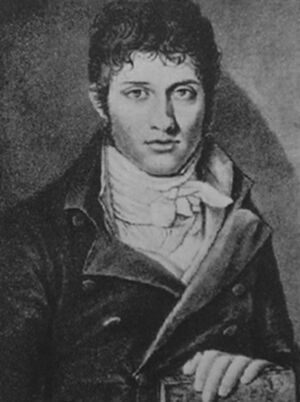Claude Charles Fauriel facts for kids
Claude Charles Fauriel (born October 21, 1772 – died July 15, 1844) was a French historian, a philologist (someone who studies languages and old texts), and a critic (someone who judges art or literature). He was known for his deep knowledge of history and languages.
Early Life and Career
Claude Fauriel was born in Saint-Étienne, France. His father was a carpenter, but Claude received a good education at special colleges in Tournon-sur-Rhône and Lyon.
He joined the army twice, first in 1793 and again in 1796. During his second time in the army, he worked as a private secretary for General J Servan de Gerbey. However, Fauriel preferred working in government and spending time with his friends and books.
In 1794, he returned to his hometown and briefly held a local government job. From 1797 to 1799, he studied very hard. He focused on the history and literature of ancient and modern Greece and Italy.
Working in Paris
In 1799, Fauriel visited Paris. There, he met Joseph Fouché, who was the minister of police. Fauriel became Fouché's private secretary. He did a good job, but his intense studies made him tired. In 1801, he had to take a three-month trip to the south of France to rest.
The next year, in 1802, he resigned from his job. This was partly because of his health. But it was also because he didn't want to work for Napoleon anymore. Napoleon had become "consul for life," which meant he had a lot of power, and Fauriel felt this went against the idea of a republic.
Friends and Studies
Fauriel wrote some articles in a magazine called Decade philosophique in 1800. These articles were about a book by Madame de Staël. This led to a friendship between them.
He also became part of a group of thinkers and writers in Paris. This group included important people like the poet Alessandro Manzoni, the writer Benjamin Constant, and the future prime minister François Guizot. Later, he met historians like Augustin Thierry.
During this time, Fauriel became very interested in philosophy. He started working on a history of Stoicism, which was an ancient Greek philosophy. Sadly, all his notes for this project were lost in 1814.
He also learned Arabic, Sanskrit, and old French dialects from the south of France. He translated several works, including a Danish poem in 1810 and two tragedies by Manzoni in 1823. In 1824-1825, he translated popular songs from modern Greece.
Later Career and Legacy
A big change happened in France in July 1830, called the July Revolution. This event brought his friends into power. This opened up new opportunities for Fauriel in higher education.
In 1830, he became a professor at the Sorbonne, a famous university in Paris. He taught about foreign literature.
One of his most important completed works was Histoire de la Gaule méridionale sous la domination des conquerants germains (History of Southern Gaul under the Rule of Germanic Conquerors), published in 1836. This was part of a larger history of southern France he had planned.
In 1836, he was chosen to be a member of the Academy of Inscriptions, a respected group of scholars. In 1837, he published a translation of a poem about the Albigensian war, which was a conflict in southern France long ago.
After he died, his friend Mary Clarke published his lectures on Provençal poetry (poetry from the south of France). These lectures were called Histoire de la poésie provençale (3 vols., 1846). Fauriel had some interesting ideas about where old French epic poems, like the chansons de geste and even the Round Table stories, came from. Even though some of his ideas are not fully accepted today, he greatly helped people study old French and Provençal languages and literature.
Another one of his works, Dante et les engines de la langue et de la littérature italiennes (Dante and the Origins of Italian Language and Literature), was published in 1854, after his death.
 | Janet Taylor Pickett |
 | Synthia Saint James |
 | Howardena Pindell |
 | Faith Ringgold |


